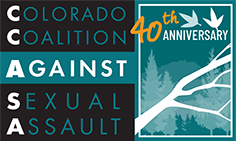By Alexa Priddy, CCASA Blogger
I’ll admit, when I first saw the headline “24 Most Sexually Violent Cities in America,” my interest was piqued. What cities are these? What do they mean “sexually violent”? I figured they may have some information I’d like to know. Sadly, they didn’t.
The article originated at DatingAdvice.com, and they did not do a “study,” “report” or “analysis” – they cut and pasted from the 2013 Uniform Crime Report data from the FBI. Data that, mind you, the FBI states quite clearly on their webpage should not be used for ranking. Yes, you too can read the FBI’s “Pitfalls of Ranking” but maybe it is actually the author at DatingAdvice.com who should be taking a look.
Unfortunately, many media outlets in my fair city of Denver jumped on the bandwagon (we were no. 5 on their bogus list) and did stories about how dangerous Denver may (or may not) be. One newspaper in Colorado Springs (a city also featured on “the list”) actually caught DatingAdvice.com’s error, and another law enforcement agency refuted the article.
But let’s discuss the real issue here. The FBI UCR data is of rape reported to law enforcement. What we all know is that the vast majority of sexual violence that happens each and every day in Colorado and across the nation is not reported to law enforcement. So, no ranking of FBI stats will ever tell you how much sexual violence is being perpetrated or how many survivors are experiencing the traumatic impact of this crime.
It is fortunate that the media attention from DatingAdvice.com’s article gave space for media to talk with organizations like CCASA about the realities of sexual violence and to our members about the support available in communities across Colorado.
If you want to offer up a more accurate article than Dating Advice.com did, here are some additional things to consider:
- It appears that the “top 20 cities” are based solely on number of reports rather than per capita rates, and doesn’t take into consideration population. It makes sense that larger, urban areas would have higher rates of reporting versus smaller, rural areas.
- Research shows that the number of rapes reported to law enforcement is estimated to be much lower than what is actually happening. There are many reasons that survivors choose not to report, including fear of not being believed, fear of deportation, fear of retaliation…and the list goes on.
- Cities MAY have higher reporting rates because survivors feel more comfortable reporting—and this is a good thing. Perhaps they have done a better job of outreach and survivors feel that they will be believed. We have seen time and again that as awareness of issues increases so do reporting rates.
- Finally, the DatingAdvice.com article acknowledges that they exclude major states (like California) and cities (like NYC) because of the definition of rape having changed and how those states reported their rates. So, this is certainly not an accurate list nationally, and those states and cities would need to be included.
So, if I were to offer up my own advice, I would say that what we should be focusing on is creating communities where survivors can feel safe and comfortable coming forward to report and where offenders are held accountable for their crimes. The Colorado city not on “the list” that I want you all to know about is Brighton. They have just launched the You Have Options Program, which allows for increased reporting options for survivors and for an anonymous reporting option. This program is a national model from Oregon that says, “A small percentage of the population commits a large number of sexual assault offenses. Utilizing the victim-centered and offender-focused strategies of the You Have Options Program allows law enforcement to work collaboratively and gather the information necessary to identify and successfully investigate serial sexual predators.” I realize this may lack the flashy headline, but when it comes to public safety and creating real change in our communities, this is the headline that matters.

